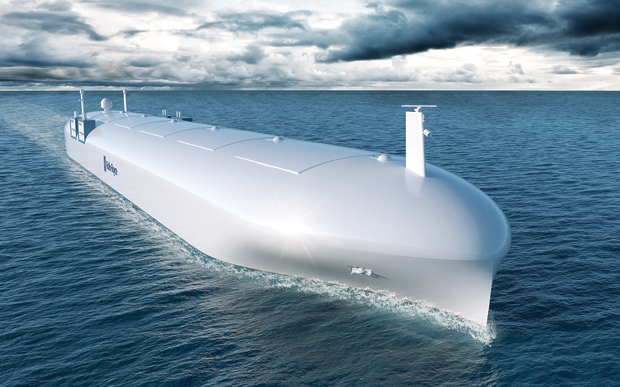“We’re on the verge of something great. We’re going to make autonomous ships a reality by 2020.”
– Karno Tenuovo, SVP Ship Intelligence, Rolls Royce
That was the introduction to a fascinating short talk by one of Google’s customers at an event this morning. At these words you could practically hear everyone in the room lean forward to find out more.
Tenuovo has an interesting background – having run Finnish Shipyards, before launching a couple of companies, then focusing on the autonomous shipping space, before being hired by Rolls Royce to turn his vision into reality. Like many inventors, he said people laughed at him at first, but with the resources of Rolls Royce behind him it looks like he will have the last laugh.
“What does the future look like? Similar to the low cost airline revolution. We’re going to see low cost shipping, with reduced manning.”
Google is an obvious partner for the project given its experience in self-driving cars, but also its experience in general purpose machine learning. Rolls Royce is using Tensor Flow for object detection and classification to help with navigation, for example. One obvious challenge will be dealing with heavy weather, but Tenuovo is confident that with the right models autonomous shipping makes sense. Rolls Royce already has a significant data-oriented business its aeronautics division, with a ton of IP in predictive maintenance.
Tenuovo said that autonomous shipping would be more environmentally friendly, partly by using electric propulsion and alternative fuels such as marine gas oil and methanol. The normal diesel fuel used in shipping is absolutely filthy, and we should try to stop using it. Another player in autonomous shipping is Kongsberg – it has an interesting trial starting next year with Yara, the Norwegian fertiliser company, of a fully electric container vessel, which will also eventually be autonomous.
While the Rolls Royce Intelligent Ship group is focusing on transportation of goods, the company, unsurprisingly, also has recently announced plans for autonomous Naval vessels. The naval project has some interesting innovations with respect to propulsion:
“The initial design features a full electric propulsion system which requires fewer auxiliary systems (lubrication, cooling system etc.) and offers better reliability levels than mechanical counterparts. It features two Rolls-Royce MTU 4000 Series gensets providing around 4MW electrical power to a 1.5MW propulsion drive. An alternative to diesel engines could be small gas turbines, further improving the system’s reliability and reducing onboard maintenance. Permanent Magnet Azipull thrusters together with a bow mounted tunnel thruster will make the vessel highly manoeuvrable. To reduce fuel consumption and extend operational range an additional 3000 kWh of energy storage will facilitate efficient low speed loiter operations and the vessel will also be fitted with photovoltaic solar panels to generate power when the vessel is on standby.”
Rolls Royce is working with research consortia including Advanced Autonomous Waterborne Applications Initiative (AAWA), Norwegian Forum for Autonomous Ships (NFAS), Machine executable collision regulations for Marine Autonomous systems (MAXCMAS), and Finnish ecosystem for autonomous marine transport (DIMECC).
The Autonomous Ship Technology Symposium is in Amsterdam next May, to “discuss and debate the technological, regulatory and legal developments necessary to make autonomous and unmanned ships a reality.” Just as with autonomous cars we have a lot of policy work to do in this area. This IEEE article on the subject is well worth a read.
disclosure: Google is a client

John Parker says:
April 9, 2018 at 4:25 pm
Seems shipping technology is developing at an exponential rate.
Hank says:
April 13, 2018 at 3:19 pm
I wonder what kind of regulations would go into autonomous shipping vs regular shipping
James Governor says:
April 19, 2018 at 6:02 pm
great question Hank. and insurance will pay a big part in how this plays out.
Jordan Blake says:
April 23, 2018 at 1:24 pm
if they can make it way more efficient and try to incorporate electrical infrastructure and reduce fossil fuel usage this would make a complete change in the shipping industry.